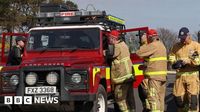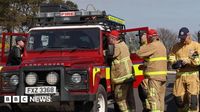A series of devastating wildfires have swept through Northern Ireland, with firefighters reporting that most of the 214 blazes were deliberately ignited. The fires, which occurred between Thursday, April 3, 2025, and Tuesday, April 8, 2025, have affected various regions, including the Mourne Mountains in County Down, Belfast, Newry, and Ballygawley.
One of the most significant incidents is a large gorse fire near Millix Road, north of Ballygawley, where approximately 40 firefighters are currently battling the flames. David Doherty from the Northern Ireland Fire and Rescue Service (NIFRS) confirmed, "we have established that this fire was started deliberately." This fire has been particularly challenging, with a fire front stretching about 1.5 miles (2.4 km) and threatening several nearby homes.
As of now, the fire service estimates that the area affected by the Ballygawley fire encompasses around 100 acres. Speaking on the situation, NIFRS commander David Harbinson expressed his ongoing concerns, noting that the dry vegetation has allowed fires to spread rapidly. He stated, "the vegetation was very dry and fires were therefore spreading rapidly." Fortunately, the fires in the Mourne Mountains have been brought under control, but authorities are advising walkers to avoid the area until further notice.
In addition to the Ballygawley fire, a gorse fire reported on Divis and Black Mountain in Belfast has also been extinguished. This blaze was tackled by 26 firefighters and was similarly believed to have been started deliberately. The NIFRS continues to monitor the situation closely, as they work to extinguish remaining pockets of fire.
Firefighters have come from as far as North Antrim to assist in combating the blazes. The region's landscape, which includes peat bogs, complicates firefighting efforts. Peat bog can trap heat, making it difficult to fully extinguish the flames. Additionally, the wildlife in the area, including nesting birds, has suffered significantly due to the fires.
In light of the recent events, Sinn Féin MP for South Down, Chris Hazzard, has called for a review of the laws concerning burning in Northern Ireland. Current regulations stipulate that the burning of vegetation such as heather, gorse (whin), or fern is permitted only between September 1 and April 14. Before any prescribed burning, individuals are advised to contact the NIFRS headquarters to discuss their plans.
The recent high temperatures and prolonged dry spell have created ideal conditions for wildfires to spread, leading to a concerning increase in incidents. From 2020 to 2024, there were no prosecutions in courts for the offence of "burning whins in closed season." However, those who set gorse fires can still face arson charges. The Department of Justice does not maintain records on the circumstances of arson prosecutions related specifically to gorse fires.
For comparison, the Republic of Ireland enforces stricter regulations, prohibiting the burning of growing vegetation between March 1 and August 31. Controlled burning is allowed under specific conditions between September 1 and February 28, but it requires consultation with both the Gardaí (police) and the fire service.
This past weekend, a major incident was declared when a large wildfire erupted near the Mourne Mountains, resulting in the evacuation of homes. This incident is also being investigated as arson, with reports indicating that there have been 147 fires across the Mourne Mountains since Thursday night.
The NIFRS continues to respond to the ongoing threat posed by these wildfires, as they work tirelessly to protect both lives and property. As the dry conditions persist, the risk of further wildfires remains high, prompting calls for increased awareness and adherence to fire safety regulations.





